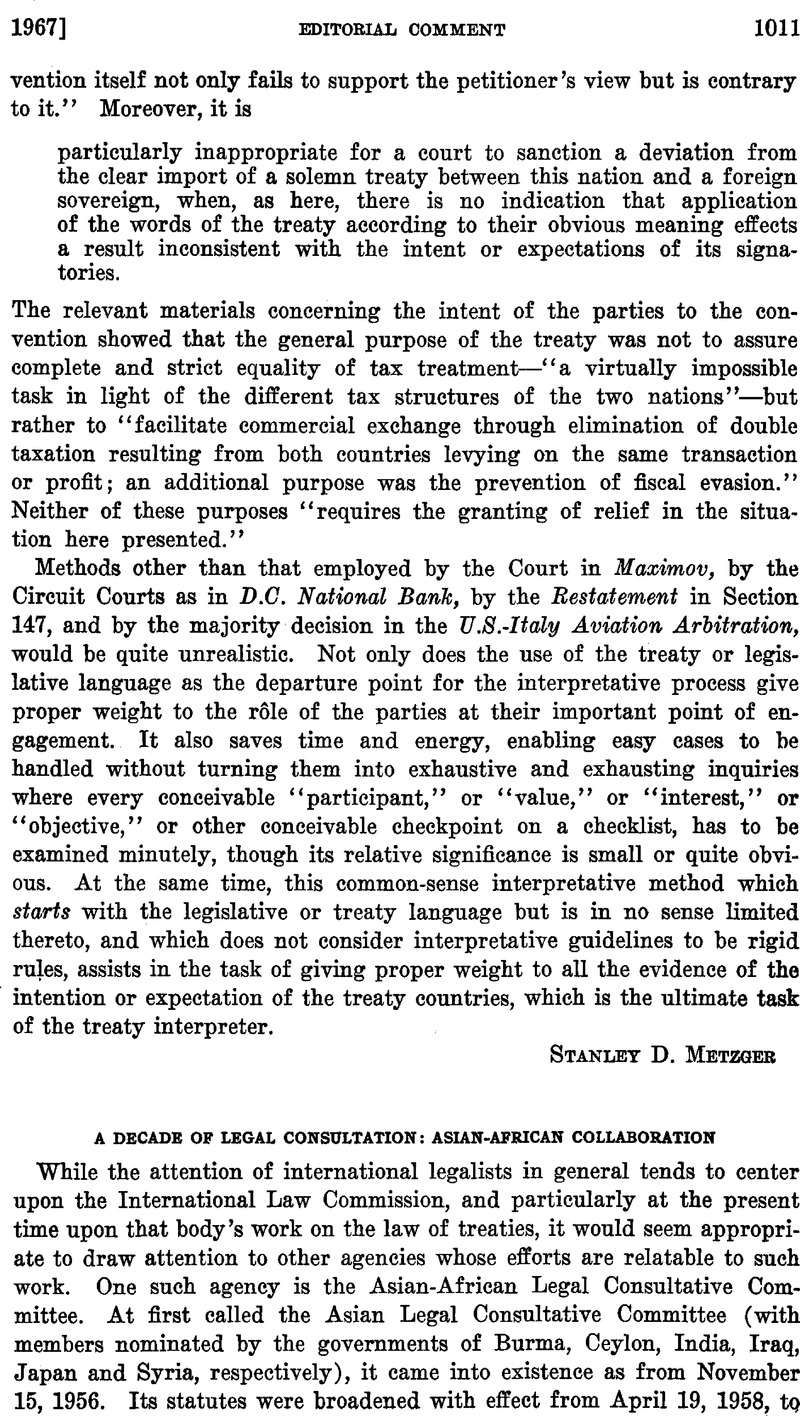Published online by Cambridge University Press: 28 March 2017

1 By the time of the 1964 session, the Committee had come to have relations -with, and was apparently receiving documents from, the United Nations, Specialized Agencies, the International Law Commission, the Organization of American States, the Arab League and the International Institute for Unification of Private Law. International organizations invited to have observers had come to include the Organization of African Unity; the Committee authorized its Secretary to invite any agency of the United Nations. Report of Sixth Session (Cairo, 1964), pp. 3, 4. The Committee has also decided to enter into consultative arrangements with the Hague Conference on Private International Law.
2 Report of the First Session (New Delhi, 1957), p. 11.
3 See note 5 below.
4 Factual, scientific and medical aspects of the last-mentioned subject received consideration, along with the question of whether a state holding territory in trust, or one in charge of a non-self-governing territory, had a legal right to use such territories for purposes of nuclear tests. Report of Sixth Session (Cairo, 1964), pp. 12, 37-39. The report of the Committee, comments and background material comprise 245 pages. The conclusions of the Committee on this general subject (reprinted in 59 A.J.I.L. 721 (1965)) are “referable to all test explosions of nuclear weapons other than underground test explosions.“
5 See “Principles Governing Admission and Treatment of Aliens,” Report of Fourth Session (Tokyo, 1961), pp. 46-180.
6 See ‘ ‘ The Reeognition and Enforcement of Foreign Judgments … Report of the Committee and Background Materials.” The report was adopted at the 1965 (Baghdad) session.
7 i Report of the Fourth Session (Tokyo, 1961), Part II, pp. 199-374.
8 Report of Seventh Session (Baghdad, 1965), pp. 23-31.
9 See, for example, the attention given to the practice of states other than member states of the Committee, as well as to states that are members, in the Final Report of the Committee on the Status of Aliens, in Report of Fourth Session (Tokyo, 1961), pp. 43-180.
10 Report of Seventh Session (Baghdad, 1965), p. 10.
11 964 I.L.C. Yearbook (I) 139-140.
12 Ibid.
13 1964 I.L.C. Yearbook (II) 122.
14 1965 ibid. (I) 1.
15 On the general subject, see Judge Philip C. Jessup, “Diversity and Uniformity in the Law of Nations,” 58 A.J.I.L. 341-358, at 357 (1964); E. P. Anand, “Eô1e of the ‘New’ Asian-African Countries in the Present International Legal Order,” 56 ibid. 383-406 (1962). See also G. M. Abi-Saab, “The Newly Independent States and the Rules of International Law: An Outline,” 8 Howard Law Journal 95-121 (1962); P. Chandrasekhara Rao, “Wider Appreciation of International Law,” 4 Indian Journal of International Law 323-328 (1964).
16 Sir Humphrey Waldock, who was Special Rapporteur on the Law of Treaties for the International Law Commission from 1961 to 1966, has stressed that Commission's search for solutions that would be in the best interest of the international community as a whole. “By 1962,” he points out, “the Commission had been enlarged to provide for a wider representation of the new states, and its constant aim was to find solutions which might so far as possible reconcile the points of view, on the one hand, of the old states and the new and, on the other, of states of differing political alignments. The readiness of members to look for common ground rather than to maintain a national point of view or to give up a personal conviction on a point of doctrine in deference to the convictions of others unquestionably owed much to their consciousness that the Commission's drafts must be such as would have a good prospect of obtaining the general assent of world legal opinion at a diplomatic conference.” “The International Law Commission and the Law of Treaties,” 4 UN Monthly Chronicle 69-76, at 72 (1967).